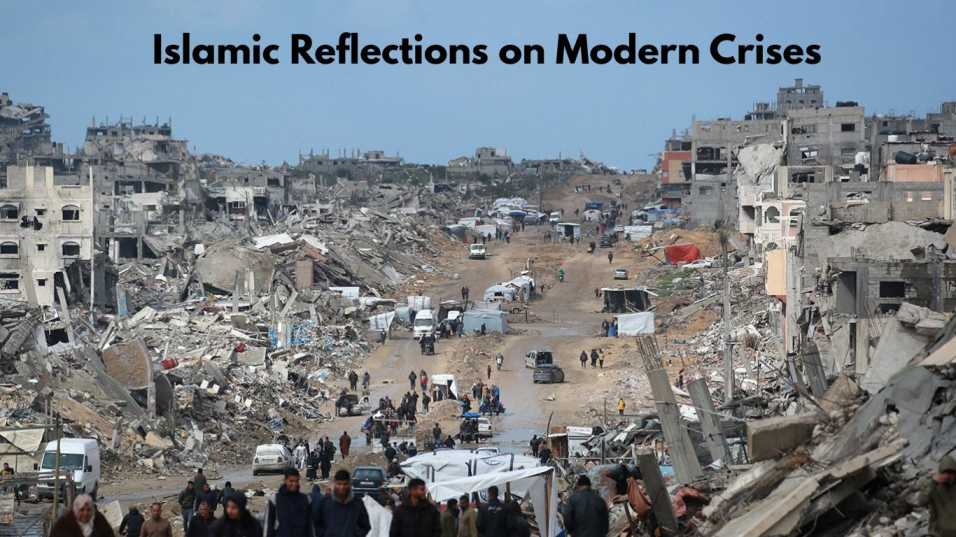Islamic Reflections on Modern Crises: Gaza, Climate Change & Global Injustice
In today’s world of endless news cycles and heartbreaking realities, many of us feel lost. From the relentless crisis in Gaza to the looming dangers of climate change, it’s easy to feel overwhelmed. But through the lens of Islamic Reflections on Modern Crises, we can find both guidance and hope.
Gaza: A Humanitarian Tragedy and a Test of Faith
The Gaza crisis isn’t just another political issue—it’s a deeply human and spiritual matter. When we look at Islamic Reflections on Modern Crises, Gaza stands out as a painful symbol of global injustice. The ongoing suffering, the children who’ve known nothing but war, the helplessness many of us feel—it all strikes the heart of what Islam teaches: justice, mercy, and solidarity.
“Stand firmly for justice…” — Qur’an 4:135
In the spirit of Islamic Reflections on Modern Crises, Muslims are reminded not to turn away. Instead, we are called to:
-
Make sincere dua for the oppressed.
-
Speak out and share the truth.
-
Support ethical charities and humanitarian aid.
-
Practice conscious consumerism, including boycotting companies complicit in oppression.
Climate Change: A Spiritual Wake-Up Call
While environmental issues often get lost in headlines, Islamic Reflections on Modern Crises help us understand that climate change is more than a scientific debate—it’s a matter of faith.
The Qur’an repeatedly refers to balance (mizan) in nature. Allah appointed humanity as khalifah (stewards) of the Earth.
“It is He who has made you successors (khalifah) upon the Earth…” — Qur’an 35:39
Through Islamic Reflections on Modern Crises, we recognize that our current climate catastrophe is the result of imbalance and overconsumption. Islam calls us to restore that balance:
-
Reduce waste and live simply.
-
Make eco-friendly choices based on Islamic ethics.
-
Teach younger generations to love and protect nature.
-
Support sustainable initiatives in our masajid and communities.
Global Injustice: Poverty, Racism, and Refugee Struggles

Another key component of Islamic Reflections on Modern Crises is the rising tide of global inequality. Whether it’s racial injustice, extreme poverty, or refugee displacement, Islam offers not just commentary—but a call to action.
The Prophet ﷺ broke down tribal hierarchies and uplifted the oppressed, reminding us that no one is superior due to race, wealth, or status.
“An Arab has no superiority over a non-Arab…” — Hadith
When viewed through Islamic Reflections on Modern Crises, this means:
-
Challenging racism wherever it exists—including within our own communities.
-
Providing long-term, sustainable help to the poor, not just one-time charity.
-
Welcoming and supporting refugees and displaced people with dignity.
How Islam Teaches Us to Respond
Faith is not meant to be passive. In times of global distress, Islamic Reflections on Modern Crises encourage us to combine prayer with purposeful action. Our religion is filled with examples of the Prophet ﷺ remaining patient while actively building solutions.
One of the most powerful reminders from the Seerah is that the Prophet never gave up—no matter how dark things looked. He planted seeds of hope even in the face of destruction.
“If the Day of Judgment comes and you have a seed in your hand, plant it.”
That hadith alone encapsulates the essence of Islamic Reflections on Modern Crises: even when the world seems to be falling apart, Islam calls us to contribute good, however small it may be.
Finding Balance: Between Despair and Duty
It’s easy to slip into despair. The images from Gaza. The rising temperatures. The suffering of innocent people. But Islamic Reflections on Modern Crises remind us that despair is not the Islamic way.
“Do not despair of the mercy of Allah…” — Qur’an 39:53
Islam gives us tools to deal with grief—prayer, action, charity, community, and above all, hope. When rooted in Islamic Reflections on Modern Crises, our response becomes meaningful, spiritual, and empowering.
Actionable Steps for Every Muslim
Based on Islamic Reflections on Modern Crises, here are some simple but powerful actions you can take today:
-
Make Daily Dua
Pick a time daily (after salah or before bed) to make dua for oppressed people and the environment. -
Reduce Waste
Be conscious of your water use, plastic consumption, and food habits. -
Give Mindfully
Support charities doing sustainable work in areas like Gaza, refugee camps, and disaster zones. -
Stay Informed, Stay Vocal
Share accurate, respectful information. Break the silence. -
Educate the Next Generation
Share lessons from the Qur’an and Seerah related to justice, nature, and compassion.
These small steps, when done consistently and sincerely, align perfectly with the teachings of Islamic Reflections on Modern Crises.
Conclusion: Carrying Light in a Time of Darkness
The world is wounded, and so are we. But Islam teaches us to be healers, not spectators. Through Islamic Reflections on Modern Crises, we’re reminded that even when we can’t fix everything, we can still shine light in our corners of the world.
Whether it’s through dua, charity, activism, or conscious living, we are never helpless. And we are never alone.
“Indeed, Allah will not change the condition of a people until they change what is in themselves.” — Qur’an 13:11
Let us carry these reflections forward—not just in thought, but in action.
For more blogs From Confusion to Confidence: My Journey as a Young Muslim -2025

